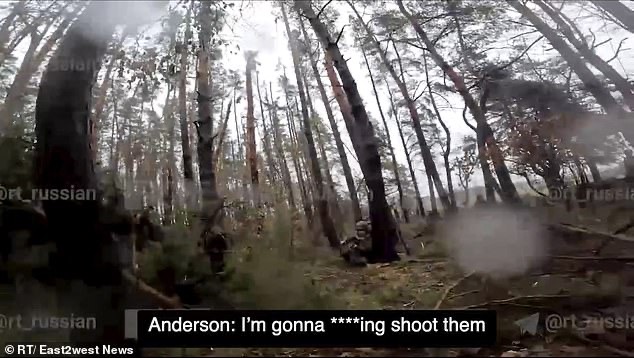War stories are often told in hushed tones of sacrifice, heartbreak, and occasionally, jaw-dropping courage. One such moment gripped the world when a British soldier, surrounded by Russian troops, looked certain doom in the face and declared, “I’m going to f***ing shoot them.” That soldier is James Scott Rhys Anderson—a man whose decision to join Ukraine’s International Legion catapulted him into one of the tensest geopolitical flashpoints on Earth. This isn’t just a tale of war—it’s one of defiance, human spirit, and the terrifying consequences of modern combat.
Captured in the Russian-controlled Kursk region, Anderson’s story has become both a rallying cry and a point of fierce debate. The video of his expletive-laced stand has gone viral, igniting a whirlwind of reactions across political and emotional spectrums. From accusations of reckless bravado to praise for his unflinching guts, Anderson’s story is now etched into the narrative of the Ukraine-Russia war. But who is he? What led to this moment? And what comes next?
Let’s dig deep into a story that reads like a movie script but is all too real—one that unveils the raw, emotional layers of war and the complicated ethics of foreign fighters.
Who Is James Scott Rhys Anderson?
James Scott Rhys Anderson wasn’t born on a battlefield, but he certainly found his way back to one. A former British soldier with military training, Anderson is not your average civilian-turned-fighter. Having served previously in the UK Armed Forces, he came with tactical knowledge, combat conditioning, and a mindset forged under pressure. But why did he leave the comforts of civilian life in the UK to plunge headfirst into a deadly war zone?
It all boils down to purpose—and perhaps a lingering need to make a difference. Anderson, like many other foreign volunteers, responded to Ukraine’s call for international assistance in the face of Russian aggression. He wasn’t a mercenary chasing money; friends describe him as someone with a deep moral compass, someone who couldn’t just watch from afar.
Still, this decision would eventually lead him to one of the darkest corners of the war—isolated, surrounded, and ultimately captured by Russian forces. But even in that bleakest moment, Anderson’s voice roared with defiance, leaving behind a legacy that would echo across social media, newsrooms, and military forums.
The Decision to Join Ukraine’s Fight
Joining someone else’s war isn’t something you do on a whim. For many like Anderson, the choice to fight in Ukraine was deeply personal. After Russia launched its full-scale invasion, Ukraine opened its arms to international volunteers, forming what is now called the International Legion of Territorial Defense of Ukraine. It attracted ex-military personnel, idealists, and those seeking a new mission in life.
Anderson’s motivations were reportedly driven by a mix of empathy for the Ukrainian cause and a desire to protect innocent civilians. Many foreign fighters, disillusioned with peacetime civilian life, find renewed purpose in conflict. There’s a camaraderie, a sense of being part of something larger than oneself.
But it’s not all idealism. Warzones strip away any romanticized notions within hours. Soldiers face brutal conditions, constant danger, and emotional scars that may never fully heal. Anderson knew what he was walking into. Or at least, he thought he did.
It’s one thing to train for combat in controlled conditions—it’s another to fight in the blood-soaked mud of Eastern Europe, against a well-equipped and highly motivated adversary. Yet he pressed forward, carrying his training, his convictions, and his grit into the heart of war.
A Mission Turned Nightmare
Every war has its turning point. For Anderson, it came somewhere deep in the forests of Kursk. Russian forces had closed in, and what started as a routine operation turned into a desperate fight for survival. According to sources and snippets from captured footage, Anderson and his unit were outmaneuvered, outnumbered, and cut off.
Whether it was faulty intelligence, poor terrain familiarity, or sheer bad luck is still unclear. What we do know is that Anderson found himself surrounded. But even in those final moments of freedom, before being captured, he made it clear he wouldn’t go down without a fight. His now-famous declaration—raw, profane, and defiant—was the kind of line you only hear in war movies. But this was real life.
What must have gone through his mind? Did he think of family, home, or just survival? The psychological strain in those moments is unimaginable. One second you’re a soldier with a mission; the next, you’re a prisoner, stripped of your weapon, your autonomy, and possibly your hope.
That mission, designed to support Ukrainian efforts in a volatile region, quickly spiraled into a grim reminder of how fast things can go wrong in war. Anderson’s capture underscores the risks these foreign fighters face—not just from bullets, but from misinformation, political games, and unpredictable enemies.
The Viral Moment – “I’m Going to F*ing Shoot Them”**
Anderson didn’t just get captured—he made a statement. As Russian troops encircled him, someone captured his final moments of resistance on camera. In the clip, Anderson, with a fierce glare and an unshaken tone, shouted, “I’m going to f***ing shoot them.” In that one sentence, he captured the essence of resistance, fearlessness, and defiance. The video spread like wildfire.
News channels replayed it. Social media turned him into a symbol of boldness. Memes popped up. Military experts dissected it. Some called him a foolhardy hero, others criticized it as suicidal bravado. But everyone agreed—it took guts.
There’s something visceral about hearing a soldier curse death in its face. It reminds us that war isn’t fought by faceless armies—it’s fought by individuals. Real people with real emotions, who bleed, cry, and shout when they’re pushed to the edge.
For many, Anderson’s words were more than just a soundbite—they were a rallying cry. A reminder that courage doesn’t always win, but it sure as hell leaves a mark.



